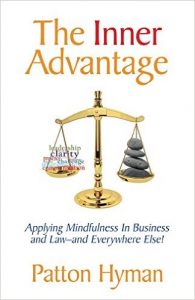by Patton Hyman
excerpted and adapted from his book The Inner Advantage

Often when people talk about human nature, it’s with a wistful quality tinged with regret, as if making allowances for unfortunate behavior. “That’s just human nature!” However, it’s interesting to consider what mindfulness reveals about “human nature.” For one, we are all different. No two of us have the same experiences. At the same time the way we function as human beings shares common characteristics. We have in common how experience arises: we all have thoughts and emotions, and we all have the ability to connect with simple presence. Because of the shared basis of experience, insights about it can be expressed to others and applied by them.
Mindfulness meditation leads you to understand that you can accommodate your thoughts, whatever they may be and however they may depart from a carefully groomed self-image. Having “disturbing” thoughts or emotions doesn’t have to disturb you. They’re just thoughts and emotions; they come and they go, but they aren’t fixed, immutable parts of who you are. If you take note of your emotions and how they feel, the familiarization process allows them to inform future behaviors and generate further confidence.
Confidence arises because when you learn to recognize and stay with fear, you realize that you can accommodate any situation. Just because you feel fear in a situation doesn’t mean that you have to avoid it. Instead, the confidence cultivated through relating to fear directly leads to a genuine attitude of humility. This is not humility in the sense of “Oh, poor me, I don’t know what to do,” but rather a willingness to remain open, to see what you can learn from observing the situation, your responses to it, and the responses of others.
As confidence builds, you’ll realize that you can stay with your experience more and more, and when you do, your awareness naturally expands, bringing you into closer connection with the events of your life. Whereas the mechanism of generating thoughts, concepts, and opinions tends to insulate you from your experience, if you can avoid getting stuck in them, your awareness naturally goes outward. It is a very simple and ordinary occurrence.
Think about presence or awareness like vision: if you open your eyes, you see what’s in front of you. You don’t have to try to make that happen, it just happens. And that’s true of all of your senses. Your sense of presence is no different. There is an expansiveness that happens when you let go of your preoccupations with concepts and opinions about what’s going on and rest in presence. When you live with confidence, expansiveness and natural inquisitiveness arise. When you open your eyes and ears—if you’re not caught up in thinking about what you see—you find your attention engaged by the world. It is a completely natural process and always available, if only you remember to notice.
Having cultivated your awareness of how fears, thoughts, and emotions arise in your mind, you begin to trust that you can engage the world in the state of presence. You also find that often when you are caught up in your habitual patterns, the world—whether as a voice, an impressive vista, or a succulent aroma or taste—suddenly interrupts them, bringing you back into the present. Responding to your experience in this way differs from habitual emotional reactivity; it is grounded in the experience of being present.
Meditation practice is a key technique for cultivating the clarity that makes mindful responsiveness possible. Thus meditation is not an end in itself but wakes you up to how your mind—your thoughts, emotions, feelings, and perceptions—actually works. That discovery allows you to experience whatever you encounter and notice how you respond.
Whether you are responding to situations, objects, or other people, you always have a choice. You can use your response as a basis for stirring up familiar mental patterns, or you can notice the responsiveness, to see how it feels. Then, as with fear, you use it as a cue or reminder that you can simply be here, be present. Also, as with fear, you don’t have to try to keep those responses from happening; let them happen, but don’t hang onto them and generate lots of thoughts and opinions about them. A response happens, you notice it, and you let it go. And there you are, present again.
However, letting the response go doesn’t mean that you ignore it. Instead, consider it as further information to take into account in guiding our activities going forward, rather than adopting the response as valid.
Relating to situations in this way brings genuine equanimity to your experience. You connect completely with whatever occurs and what it brings up in you. It is not a matter of smoothing things over—you can just be there with it. You don’t have to get angry or upset about it, nor do you have to trumpet your response or solidify your point of view with it. Presence allows you to stay completely connected to whatever your experience is.
When you combine presence with the determination to stay with fear, you avail yourself of a state that can be called “dynamic equanimity,” the ability to remain present in the midst of activity. Inevitably you’ll encounter situations that are difficult and challenging, and they will occur not only in situations that are “problems.” Positive developments can also have difficulties, such as when a customer or client places a huge order or initiates a large process or case that you’ll have to stretch to meet. Dynamic equanimity allows you to cut through the resulting anxiety and agitation and meet the situation with mindfulness, staying present without panicking and ultimately giving you a greater chance of success.
Dynamic equanimity doesn’t guarantee coming up with a perfect answer, strategy, or response; rather, it means that you can bring the focus that you discover through mindfulness into the midst of activity or action. It’s not a matter of becoming even or smooth but of becoming a resourceful person. Moreover, dynamic equanimity begins to permeate your presence. It affects your appearance and demeanor. Others come to see you as trustworthy and reasonable because you’re not trying to make a big deal out of what happens.



